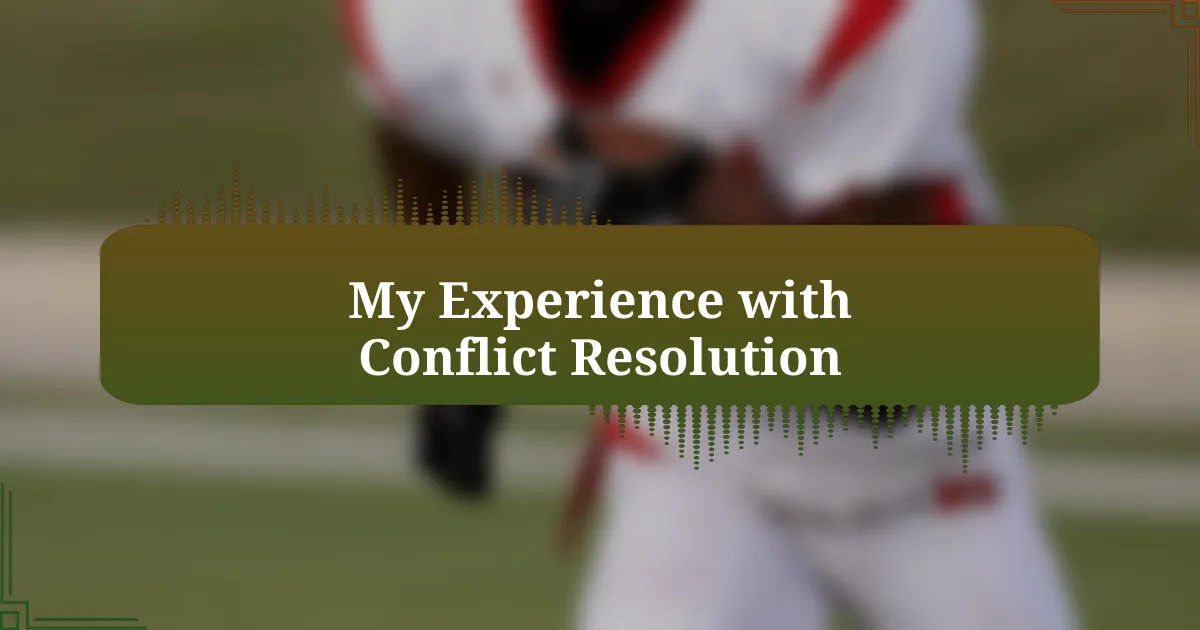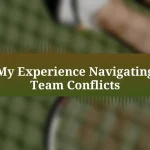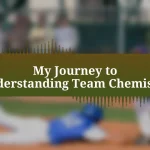Key takeaways:
- Effective communication and empathy are crucial in resolving conflicts within teams, transforming disagreements into collaborative efforts.
- Acknowledging individual roles and setting clear expectations significantly reduces misunderstandings and conflicts during games.
- Facilitating open discussions and addressing issues collectively can foster stronger bonds and enhance team harmony.
- Patience and understanding of teammates’ personal struggles are essential in fostering a supportive team environment.
Author: Evelyn Harper
Bio: Evelyn Harper is an award-winning author known for her evocative storytelling and rich character development. With a background in psychology, she weaves intricate narratives that explore the complexities of human relationships. Her debut novel, “Whispers in the Wind,” received critical acclaim and established her as a fresh voice in contemporary fiction. A graduate of the Iowa Writers’ Workshop, Evelyn resides in Portland, Oregon, where she continues to write and inspire aspiring authors through workshops and mentorship. When not immersed in her writing, she enjoys hiking the Pacific Northwest trails and sipping coffee at local cafes.
Understanding conflict resolution
Conflict resolution is an essential skill, especially in team sports like cricket, where differing opinions and emotions can arise. When I first faced a disagreement during practice, I realized how easy it was to let frustration cloud judgment. Has there ever been a moment on the field when you felt misunderstood? That’s where the groundwork for resolution begins—acknowledging feelings and finding common ground.
I’ve learned that effective communication is vital. In one memorable game, a miscommunication about strategy led to a loss. Instead of pointing fingers, we sat down afterward to discuss what had happened. Listening to each other’s perspectives not only cleared the air but also strengthened our team bond. It amazes me how a simple conversation can transform conflict into collaboration.
I often find that empathy plays a huge role in resolving disputes. When a teammate lost his temper, I remembered how stressful the game could be. Rather than react defensively, I approached him with understanding, asking how he felt in that moment. It made all the difference—sometimes, all someone needs is a bit of compassion to move forward. Don’t you agree that a little kindness can go a long way in resolving conflicts?
Common conflicts in cricket teams
It’s fascinating how conflicts can arise from differing roles within the team. I remember a time when I felt overlooked during a match; I was positioned lower in the batting order despite my readiness to contribute. This led to frustrations bubbling between teammates, as some felt my skills weren’t being utilized effectively. Isn’t it a shame how one misalignment can create tension instead of teamwork?
Another common conflict is overplaying individual strengths versus team strategies. During one game, a teammate insisted on taking risky shots rather than playing it safe. I could sense the growing frustration among us all. At that moment, I realized how crucial it is to balance personal flair with the team’s game plan. Have you ever felt torn between personal ambition and team unity? Navigating this requires a thoughtful approach to maintain harmony while respecting individual talents.
Lastly, I can’t overlook the impact of personal background and expectations in a team setting. I once was on a squad where players had varying levels of experience. This led to misconceptions; some felt that newer players weren’t putting in the effort. I took the initiative to share how intimidating it can be to step onto the field for the first time, which opened up conversations about respect and support. Aren’t those discussions so crucial for fostering understanding in a diverse team?
Techniques for effective conflict resolution
When it comes to conflict resolution, open communication stands out as an effective technique. In a previous match, I confronted a teammate about his approach to batting, which had caused frustration among us. We decided to have a candid talk during a break, where I shared my perspective and listened to his reasoning. This exchange transformed our relationship, turning potential hostility into mutual respect. Have you ever experienced a similar breakthrough from a simple conversation?
Another technique that I find invaluable is setting clear expectations. During one season, our captain made it a point to establish specific roles for each player before games. I noticed a remarkable decrease in misunderstandings as we all knew our responsibilities. The clarity minimized conflict significantly. Isn’t it interesting how just being clear about roles can align a team and foster a more collaborative environment?
Lastly, practicing empathy can be a game-changer in conflict situations. I remember a time when my emotional reactions got the best of me during a heated discussion. Instead of responding defensively, I paused and tried to understand how my teammates were feeling. It was a humbling experience that taught me that recognizing others’ perspectives often diffuses tension. Have you ever placed yourself in someone else’s shoes to see the conflict differently?
My personal conflict resolution experiences
Navigating conflict can feel overwhelming, but I’ve learned that it often leads to growth. There was a particular match where disagreements over strategy flared up. Frustration hung in the air, but instead of letting it eat away at our morale, I called for a small team huddle. Sharing my thoughts openly allowed others to voice theirs, and it was enlightening to see how each of us had valid concerns. Have you ever noticed how collective dialogue can shift the atmosphere entirely?
I had another experience where my impulsive words during a game led to unintentional hurt feelings. I knew I had crossed a line, so I took a moment to reflect. Approaching my teammate later, I expressed my regret and sought to understand his feelings. That conversation not only mended our relationship but also made me more aware of my impact on others. Have you ever found yourself regretting something you said, only to realize that taking responsibility can heal rifts?
Lastly, I’ve realized that sometimes, simply acknowledging conflict is a crucial step. There was a point when our team was underperforming, and the tension was palpable. Instead of ignoring it, I suggested we address our struggles collectively. By acknowledging our issues, we created a safe space to air grievances. I found that facing conflicts head-on often fosters a stronger bond among teammates. Have you encountered moments where confronting the issue actually brought your team closer?
Lessons learned from resolving conflicts
Resolving conflicts has taught me the value of empathy and understanding. I remember a tense moment during a practice session when two teammates clashed over their playing styles. Watching their frustration unfold was difficult, but I decided to facilitate a discussion between them. This led to a surprising realization: they both cared deeply about the team’s success, but had different ideas on how to achieve it. Can you imagine how much smoother things flowed once they recognized their shared goal?
Another significant lesson was the importance of patience. There was an instance where I felt a teammate was not pulling his weight, leading to resentment building up on my end. Instead of confronting him immediately, I took some time to observe and reflect. Through that observation, I learned he was grappling with personal issues affecting his performance. This pause not only spared me from an unnecessary confrontation, but it also enriched my understanding of the human side of my teammates. How often do we jump to conclusions without seeing the full picture?
Finally, I’ve come to appreciate the power of collaboration in conflict resolution. During one particularly challenging tournament, our team faced significant pressure, and tensions ran high. Rather than letting the stress divide us, I initiated a problem-solving workshop where everyone could pitch in their ideas. This collaborative effort not only resolved our immediate concerns but also strengthened our unity as a team. Have you ever seen how teamwork in overcoming challenges can bond people in ways you never expected?



